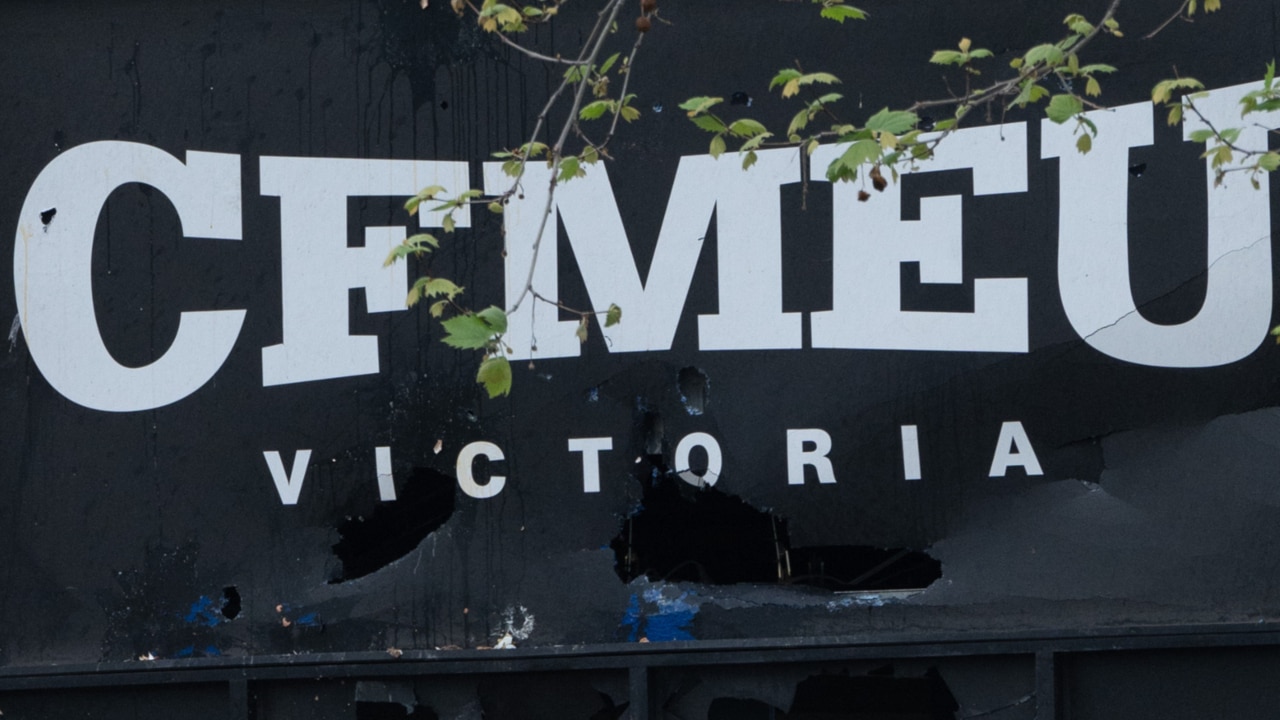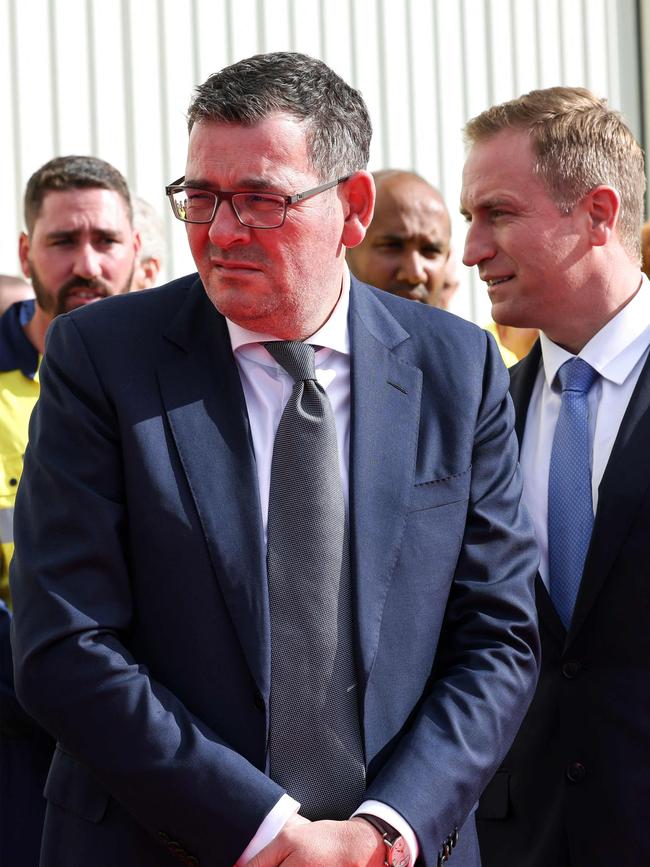
Of course, he has known all along about the appalling, despicable, disreputable, corrupt and illegal behaviour of the construction branch of the Construction, Forestry and Maritime Employees Union. It’s just been more convenient for him and his party to turn a blind eye.
The Labor Party has been only too happy to collect the affiliation fees as well as the donations while handing out various favours to the union in return. The abolition of the Australian Building and Construction Commission is a clear case in point.
The agency annoyed CFMEU officials. After all, in its last iteration, it handed out fines to the union in excess of $10m. To be sure, the CFMEU regarded this sum as just the cost of doing business, but the officials still wanted it gone.

It was one of the first acts of Burke when he became minister. All that faux rationale about the ABCC being obsessed with minor issues was just a diversion lest anyone think this was a clear example of political payback – which it clearly was. It’s worth taking a look at recent developments to understand just why the CFMEU – or at least its construction division – has become such a rogue organisation. Traditionally, the CFMEU had coverage of building workers in large CBD projects; the Australian Workers Union dominated civil engineering.
This began to change a decade or so ago when it became clear that a lot of the action would be occurring in large infrastructure projects – roads, bridges, tunnels and the like. The CFMEU moved in, aggressively sidelining the more reasonable AWU.
The real reason Melbourne’s East West Link project was ditched in 2015 by the newly elected Victorian Labor government with its CFMEU-aligned premier Dan Andrews was the fact it was an AWU project, not a CFMEU project. The Victorian taxpayer forked out over $1bn for that outrageous decision.

In the meantime, the number of head contractors that were in position to tender for these large projects was relatively small and getting smaller. A number of these large construction firms are overseas-owned and the managers stay away from local public policy issues. In order for tenders to be successful, particularly with Labor state governments, it was necessary to secure the support of the relevant union, most commonly the CFMEU.
In turn, the CFMEU imposed the condition that the enterprise agreement between the head contractor and the union would apply to all sub-contractors on a project, including the requirement for compulsory union membership. It is now clear that it was not uncommon for sub-contractors to pay a ‘‘fee’’ to union officials to secure agreement coverage.
No genuine enterprise bargaining ever took place but the Fair Work Commission simply waved through agreements between the sub-contractors and the CFMEU, notwithstanding their template nature. The FWC has never applied much scrutiny to union-approved agreements.
By securing a monopoly over the supply of labour, the CFMEU was able to enhance its power base and cause trouble when and where it decided to. Union officials regularly barge onto worksites without the required right of entry permits, although kickbacks can make the disruption go away.
The reward for causing trouble is often some additional benefits for the workers, although in some instances there are legal cases brought against the union, with fines often imposed with strong words of disapproval by the presiding judge.
The union has been very thorough in securing their monopoly over the supply of labour. Notwithstanding a nod or two about increasing the number of women workers, there has been very little progress on that front. Construction is the least feminised industry of all industries. The leadership of the CFMEU is overwhelmingly male.

Making sure that the number of migrants working in construction is kept to a minimum was another tactic. Less than a quarter of workers in the construction industry was born overseas, compared with 32 per cent in all other industries. The union has made sure that the skilled building trades never make it onto the Skilled Migration list that provides migrants with secure entry into the country.
A picture emerges of an uncompetitive industry in which the CFMEU essentially dictates the terms on which companies operate and the companies go along with the unsavoury conduct of the CFMEU because there is no choice. It leads to terrible outcomes for the project developers which are very often governments, with massive cost blowouts and delays being common features.
In the case of Victoria’s Big Build program, the taxpayers will be carrying an enormous burden for years to come. The Allan government’s decision to proceed with the completely unjustified Suburban Rail Loop can only be understood as a sop to the CFMEU.
Why do companies not arc up and attempt to operate more efficiently and cost-effectively? Going by the example of Boral in Victoria and the effective boycott imposed by the CFMEU, it makes perfect sense to surrender rather than fight.
In that case, Boral had delivered concrete to a Grocon building site but Grocon, owned by the Grollo family, was a company on the CFMEU’s blacklist. In turn, the CFMEU attempted to persuade other customers of Boral to use alternative suppliers – action that continued for many months. The ACCC accused the union of undertaking a secondary boycott, which is illegal under the Competition and Consumer Act.

In the end, the court found against the CFMEU but imposed a relatively minor fine. According to the then ACCC chair, Rod Sims, “the commercial construction industry is economically important for Australia and this type of conduct can impact the targeted companies as well as sub-contractors and competition in the industry more generally. We pursued this matter for five years because we wanted to send a strong message to others that this sort of conduct is illegal and will not be tolerated.”
What this case really demonstrated is how lame the law is in dealing with the egregious anti-competitive behaviour of the CFMEU. With the exception of the secondary boycott provisions, the trade unions are simply not covered by competition law.
Other laws are simply ineffective. The registration provisions in the Fair Work Act, for instance, are a joke and neither the Fair Work Commission nor the Fair Work Ombudsman has ever acted to reel in the behaviour of the CFMEU.
The federal government’s decision to appoint an administrator to take charge of the construction division of the CFMEU in some states is unlikely to achieve anything lasting. The current officials won’t take this action lying down and will refuse to co-operate. In the meantime, the CFMEU has just signed an outrageously generous enterprise agreement in Victoria which awaits certification by the FWC.
If the Albanese government was really seriously committed to eliminating bad behaviour in the construction industry, it would proceed with the deregistration of the CFMEU, refuse to provide any further funds for CFMEU projects and contemplate laws similar to the RICO (anti-racketeering) laws in the US. I won’t be holding my breath.








Employment and Industrial Relations Minister Tony Burke is like that boy in the orchard. Holding the stolen apples behind his back, he declares to the farmer: Who? Me?